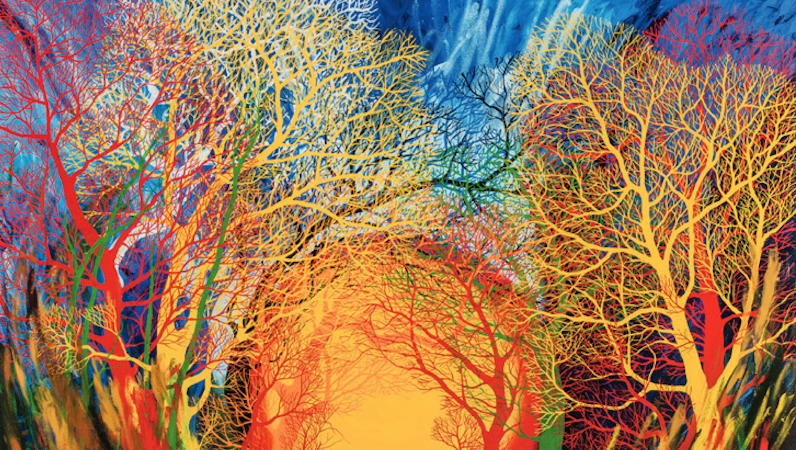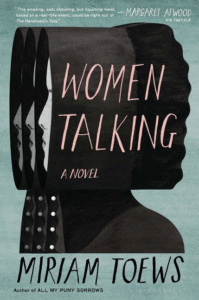
First to the New York Times, where We The Animals author Justin Torres calls Ocean Vuong’s lyrical, deeply felt debut novel, On Earth We’re Briefly Gorgeous, “brilliant in the way it pays attention not to what our thoughts make us feel, but to what our feelings make us think.”
Over at Bookforum, novelist and essayist Leslie Jamison was captivated by Miriam Toews’ harrowing novel of trauma and reclamation: “[Women Talking is] less an indignant manifesto about sexual trauma, or a speculative celebration of female empowerment,” writes Jamison, “than it is a confession of violence as something stitched into the fabric of every community, and an exploration of what it means to claim communal thought—even disagreement itself—as an inalienable human right.”
Meanwhile, in a fascinating Los Angeles Review of Books essay comparing two recent works of climate change analysis (Bill McKibben’s Falter and David Wallace-Well’s The Uninhabitable Earth), Roy Scranton takes the authors to task somewhat for failing to confront the full horror of what’s in store.
We’ve also got Dwight Garner of the New York Times on nature writer Robert MacFarlane’s Underland (“his is an excellent book—fearless and subtle, empathic and strange”) and Anna Altman’s New Yorker piece on Esmé Weijun Wang’s The Collected Schizophrenias (“joins a small but significant canon…[of] books that elucidate the experiences of high-functioning women whose minds are both their proudest assets and their biggest liabilities”).
*

“…less an indignant manifesto about sexual trauma, or a speculative celebration of female empowerment, than it is a confession of violence as something stitched into the fabric of every community, and an exploration of what it means to claim communal thought—even disagreement itself—as an inalienable human right … crackles with the energy of consciousness on every page. Its attention is tender and funny, its characters utterly distinct and alive … The novel is deeply aware of how this simultaneity—the weighty sitting shoulder to shoulder with the daily—is especially inescapable for women … Toews doesn’t just allow the trivial to live alongside the weighty, she insists on it…By refusing to segregate the mundane from the consequential, Toews implicitly argues that what we call trivial often isn’t trivial at all—that just as much truth lives inside those small moments of care and grace as in our grand philosophizing about authority and justice—and allows her characters to come to life as more than helpless victims or walking thesis statements … resists false binaries at every turn. Profundity and banality are entangled … This novel knows that truth: Violence is something more systemic than a few rapists; more like a wildfire than a small burn contained to a few toxic bodies you can lock away for good … holds the persistence of their grace while refusing to make false promises about the redemption or vindication waiting for them beyond its final page.”
–Leslie Jamison on Miriam Toews’ Women Talking (Bookforum)
“…it’s an experimental, highly poetic novel, and therefore difficult to describe … Vuong is masterly at creating indelible, impressionistic images … although the book’s break into poetic form is perhaps designed to suggest that there are some expressions only poetry can communicate, at times the stylistic switches can feel like adornments on a powerful story that never required dressing up … Vuong beautifully evokes this boy’s seductive power over Little Dog: This is some of the most moving writing I’ve read about two boys experimenting together (and reader, I’ve read a lot). The sex here is good because it feels honest, messy, joyous, awkward, painful … The tenderness of the prose feels like a triumph against a world hellbent on embittering the tenderhearted … the book is brilliant in the way it pays attention not to what our thoughts make us feel, but to what our feelings make us think. To what kinds of truth does feeling lead?”
–Justin Torres on Ocean Vuong’s On Earth We’re Briefly Gorgeous (The New York Times Book Review)

“Despite the unconvincing cheer for human empowerment with which he ends his book, however, David Wallace-Wells understands the seriousness of our predicament. And despite his atavistic Protestant optimism, even Bill McKibben can see that the odds are not in our favor. The challenge these two capable, intelligent writers struggle with so powerfully, and which they so disappointingly fail to meet, is a challenge that anyone who thinks seriously about climate change confronts: the danger we face is utterly unlike anything humanity has ever faced before. Their moral fables don’t really fit our situation, but neither does the traditional narrative of apocalypse, nor the story of wartime mobilization, nor the story of innovation and progress, nor narratives of heroic overcoming. Climate change is bigger than any individual moral choice. It’s bigger than the New Deal, bigger than the Marshall Plan, bigger than World War II, bigger than racism, sexism, inequality, slavery, the Holocaust, the end of nature, the Sixth Extinction, famine, war, and plague all put together, because the chaos it’s bringing is going to supercharge every other problem. Successfully meeting this crisis would require an abrupt, traumatic revolution in global human society; failing to meet it will be even worse. This is the truth we struggle to comprehend in narrative, the reality our stories must make sense of. The all-too-real possibility we must confront—and which David Wallace-Wells and Bill McKibben notably refuse—is that the story we’re living is a tragedy that ends in disaster, no matter what.”
–Roy Scranton on Bill McKibben’s Falter and David Wallace-Wells’ The Uninhabitable Earth (Los Angeles Review of Books)
“There’s a bit of John Muir and John McPhee, patient writers and naturalists both, in Macfarlane’s work. Is he a young fogey? Sometimes. He can ladle on that BBC/PBS gently-eat-your-peas earth-show narration … Yet there’s a bit of Geoff Dyer, of the critical wildcat, in him. There’s the prickling sense, reading Macfarlane like Dyer, that a library door or a manhole cover or a bosky path might lead you not just to the end of a chapter but to a drugs party or a rave … Macfarlane’s writing can be humid … More often it is superb. He is so good at what he does, and has won so many awards for his books, that there has begun to be pushback in England, just to keep his career in perspective … this is an excellent book—fearless and subtle, empathic and strange. It is the product of real attention and tongue-and-groove workmanship. What might have been this book’s last sentence instead arrives on Page 402: ‘This is the way the world ends, this is the way the world ends, this is the way the world ends—not with a bang but a visitors’ center.'”
–Dwight Garner on Robert MacFarlane’s Underland (The New York Times)
“Wang says that it is far more common for people who suffer from mental illness to be written about—by caregivers, by researchers—than to offer their own accounts. Her book, in offering hers, joins a small but significant canon, including Kay Redfield Jamison’s An Unquiet Mind and Elyn R. Saks’s The Center Cannot Hold, two books that elucidate the experiences of high-functioning women whose minds are both their proudest assets and their biggest liabilities … Wang deftly articulates how a diagnosis can shift a patient’s sense of self, prompting simultaneous confusion and relief … The Collected Schizophrenias is not a memoir, nor does it tell a linear story about the author. Wang prefers to use her own experience as a point of departure for philosophical inquiry. In ‘Toward a Pathology of the Possessed,’ she digests a horrifying story of a violent, schizophrenic man who was shot and killed by his sister while their mother waited in the car. She considers the burden that schizophrenia presents for family caregivers, and what remains of a person, and their relationships, when their personality has been mutilated by illness. Both the idea that mental illness destroys the person who existed before and the question of whether a self exists apart from illness trouble Wang … It’s Wang’s ability to reconcile these opposing realities, to allow them to persist in contradiction, that feels most radical about her approach to being sick.”
–Anna Altman on Esmé Weijun Wang’s The Collected Schizophrenias (The New Yorker)

